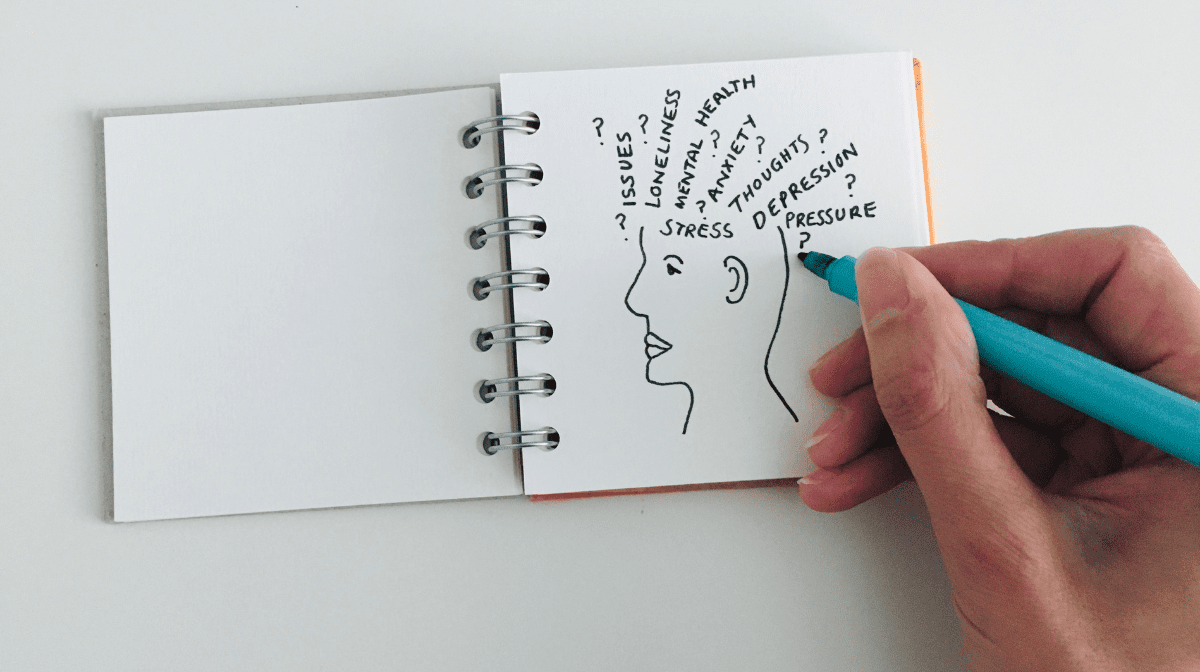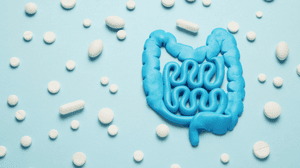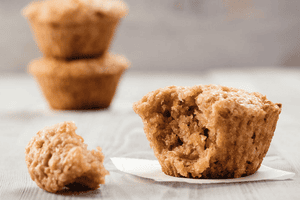
When you’re waiting at the dentists before a check-up, you’ve got a big presentation coming up at work, or you’re about to ask that certain someone out on a first date – you might feel your hands go clammy, your legs shake, or your body go cold. What you’re actually experiencing is the effects of anxiety, which all of us will encounter at some point in our lives for a whole lot of different reasons.
Anxiety is a normal and natural state our body enters to help us deal with a stressful, or high-stakes situation, and in fact, it can sometimes be a good thing. A rush of adrenaline might make it easier to think on your feet, and looking back to our primate ancestors, anxiety helped them to approach a dangerous situation with care.1
Although anxiety is normal – and sometimes even helpful for dealing with what life throws at us – experiencing anxiety on a regular basis, about situations with low actual risk to your safety, can become problematic.
If you find yourself feeling anxious about everyday tasks and fun activities such as leaving the house, talking on the phone, or meeting up with people – life can become a bit more complicated. If you feel like anxiety could be stopping you from doing the things you love, you’ll be glad to know there are ways to support and manage it. Read on to better understand the signs of anxiety and what you can do if you are suffering from it.
What are the signs and symptoms of anxiety?
Anxiety can present in many different ways, and the symptoms can vary from person to person. However, some common signs and symptoms of anxiety include:
- Physical symptoms such as sweating, trembling, fatigue or muscle tension, a racing heartbeat, or nausea
- Excessive or persistent worry or fear about everyday situations
- Avoidance of social situations or activities (social anxiety)
- Panic attacks, which can include symptoms such as shortness of breath, chest pain, and dizziness
- Restlessness
- Feeling tense or on edge2
In addition to physical symptoms, anxiety can also affect our mental health in less obvious ways. Some more common signs of stress and anxiety include difficulty concentrating or focusing, feeling overwhelmed or helpless, racing thoughts, and irritability or agitation.3
What are the signs of anxiety in children?
Young children can experience anxiety, just like teens and adults can. But it may be more difficult for them to understand how they are feeling, and why they are feeling that way. Similarly, they may have trouble expressing exactly what it is they are feeling.
As a parent or caregiver, it’s important to be aware of the way anxiety might present itself in children, as it doesn’t always look like what you’d expect it to. A child who complains of a stomach ache before going to school may actually be feeling this way because they are feeling anxious about going. It’s important to talk to them about how they’re feeling, to better understand the problem.
A child with anxiety may also be more likely to have nightmares, or have trouble going to sleep. They might also have difficulty concentrating, and seem more irritable or have more outbursts.4 Some of these behaviours might seem common in children, but it’s important to take them seriously, to make sure they aren’t a sign of anxiety.
The connection between anxiety and gut health
Ever felt a little sick before doing something you’ve been dreading – like an exam, or bungee jumping?! Have you ever lost your appetite, or had to run to the toilet, when you’re anxious about something? Anxiety can manifest as various physical symptoms that can make daily life challenging, such as nausea, heart palpitations, and shortness of breath. Gastrointestinal problems are a common symptom of anxiety, 5 and understanding this is the case can help you to manage both.
Plain and simple: our negative emotions can have a number of detrimental effects on our gut.6 The gut and the brain are linked through the gut-brain axis, which is a complex pathway that allows communicate between the relevant parties.7Inside your gut are a collection of microorganisms that aid digestion and protect against pathogens – among other functions.8 This collection of microorganisms is called the gut microbiome. The gut microbiome also communicates with the gut-brain axis.9 It’s no wonder, then, that the anxiety you experience in your brain has an effect on your gut – they are all interacting with each other.
Dysbiosis – the term for when the diverse array of microorganisms in your gut is out of balance – has been associated with a range of health conditions. There is a notable link between dysbiosis and anxiety.10Chronic anxiety can also make pre-existing digestive issues worse, such as irritable bowel syndrome and stomach ulcers.11
Supporting good gut bacteria when dealing with anxiety
So, what can you do to support both your gut and your mental wellness? Well, one of the most important things to focus on is making sure your gut microbiome is in balance – because of the implications for the gut-brain axis, among other health factors.
And one way you can support good bacteria in the gut is by getting more of it into your diet, through high-probiotic foods such as kefir, or taken as a supplement: Alflorex®, for one, is formulated to support a healthy gut.
Recovering and healing from anxiety: steps and strategies
Generalised anxiety disorder and chronic anxiety are prevalent mental health conditions that affect millions of people worldwide. If you suspect you suffer from one of these or a related condition – or you have just been diagnosed with an anxiety disorder – you may feel overwhelmed, frightened, or even hopeless.
The good news is that there are several steps and strategies that can help you recover and heal from anxiety. We’ll explore some of the best practices for managing anxiety, which include therapy, medication, and lifestyle changes. We'll also explain how gut health and the microbiome impact mental health, and how to support good bacteria in the gut.
Therapy
One of the most effective treatments for anxiety is therapy. There are different types of therapies that can be used to treat anxiety disorders, but Cognitive Behavioural Therapy (CBT) is the most commonly used. CBT is a type of talk therapy that helps individuals identify and change negative patterns of thinking and behaviour that contribute to anxiety.12 CBT can be done individually or in a group, and it typically involves weekly sessions with a trained therapist.
Medication
In some cases, medication may be prescribed to manage severe anxiety symptoms. Anti-anxiety medications, such as benzodiazepines and antidepressants, can help reduce symptoms of anxiety, including panic attacks, shortness of breath, and irritability.13 It's essential to work with a healthcare provider to determine if medication is the best option for you and to monitor any potential side effects.
Lifestyle changes
In addition to therapy and medication, there are several lifestyle changes that can help manage anxiety symptoms. Engaging in regular exercise, practising mindfulness, and getting enough sleep are all important factors in healing from and managing anxiety.14 Journaling 15 can also be a great way to put stressful thoughts to the side. It can also be a form of mindfulness without meditation – offering you the mental health benefits of mindfulness, even if you find meditating difficult.16
Diet and supplements
We know about the gut-brain axis, and the associations between our mental health and our gut health. Therefore, supporting your gut health to better manage anxiety makes sense. Taking probiotics is a great way to support your gut health. Zenflore® is a probiotic that is specially formulated to not only support gut function, but to support mental wellness too. This, plus a healthy and well-balanced diet, will set you on the right track for your overall health.
Recovering and healing from anxiety takes time, effort, and most importantly – patience. It’s important to be kind to yourself to manage anxiety, rather than punishing yourself for repeating the same patterns, or feeling like you can’t get through. There are always people around to help, and it's important to reach out to a medical professional when you need one. Even if you’re not sure you have an anxiety disorder, a trip to your GP can help you to clarify how you’re feeling, and determine the best treatment options for you – whether they are lifestyle changes, medication, therapy, or a combination of these. Don't let anxiety take control of your life – take charge of your health and start healing today.
Discover Other Mental Wellbeing Blogs

Stress Triggers and Remedies
We talk through the causes of stress and how to reduce stress in our latest blog.

Instant stress relief
Do you need quick stress relief? Read our blog to discover these instant stress relievers.
Shop Zenflore Products
2. https://www.mayoclinic.org/diseases-conditions/anxiety/symptoms-causes/syc-20350961
3. https://www.nimh.nih.gov/health/topics/anxiety-disorders
4. https://www.nhs.uk/mental-health/children-and-young-adults/advice-for-parents/anxiety-in-children/
5. https://www.mayoclinic.org/diseases-conditions/anxiety/symptoms-causes/syc-20350961
6. https://www.health.harvard.edu/diseases-and-conditions/the-gut-brain-connection
8. https://my.clevelandclinic.org/health/articles/14598-probiotics
12. https://www.mayoclinic.org/tests-procedures/cognitive-behavioral-therapy/about/pac-20384610
13. https://www.nhs.uk/mental-health/conditions/generalised-anxiety-disorder/treatment/
14. https://www.betterhealth.vic.gov.au/health/conditionsandtreatments/anxiety-treatment-options
15. https://www.precisionbiotics.co.uk/blog/mental-wellbeing/journaling-for-mental-health/
16. https://www.precisionbiotics.co.uk/blog/mental-wellbeing/mindfulness-without-meditation/









